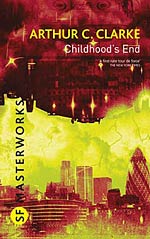
![]() Badseedgirl
Badseedgirl
6/29/2014
![]()
It is shameful to admit it, but I have been approaching the Worlds Without End Grandmaster Challenge with growing trepidation. At times I find it difficult to appreciate the works of these authors. I know they are important authors for the genre, but still.... That is why I was so happy to have read Arthur C. Clarke's Childhood's End. It was easy for me to see why he was considered a Grand Master. He is clearly a master of the suspense and was able to keep me as a reader engrossed.
The novel is broken up into three parts, each containing a mystery to keep the reader engaged. In the first part "Earth And The Overlord. The great buildup in this part was what the Overlords actually look like. By the middle of part one I was convinced that the Overlords were either a gelatinous blob, destined to absorb a theatre full of teenage movie goers, or would be a square headed giant who communicates through telepathy and would be carrying a book entitled "To Serve Man", or a man lizard to be revealed eating a rodent by a fearless reporter sneaking through the ventilation of the aliens ship. Your age will be revealed by which reference you were able to identify. Just saying. When they are finally revealed in the beginning of part two, "The Golden Age", it was shocking because I was just not expecting it to be what it was. I was ready for all the science fiction clichés but the reality was more and less than I expected. That is all I am going to say on that topic to avoid spoilers.
Most of the second part deals with one character, Jan Rodrick's attempt to travel to the Overlord's home world. The rules implemented by the Overlords on Earth's population effectively halted space research and exploration. Jan was unable to accept this and conceived of a plan to stow away on an Overlord ship. Will he make it, and what will he find is the mystery of the novel? Throughout both of the first two parts there was an underlying and overarching question about why the Overlords are here on Earth, why they are molding and changing humanity, and what exactly do they want from and with us.
This is finally answered in the third part. The reader also finds out what became of Jan Rodrick. The ending is unexpected to say the least. When I read the last page I was filled with an uncomfortable combination of sadness and hope, with just a dash of pity and anger mixed in. It takes a pretty good author to be able to wring that many emotions out of one reader from one book. The ending did not really leave me feeling warm and fuzzy about humanity or our first contact with an alien entity. But I'm guessing that is what Mr. Clarke was shooting for with this novel. If it was, mission accomplished. If not, well I still liked it.